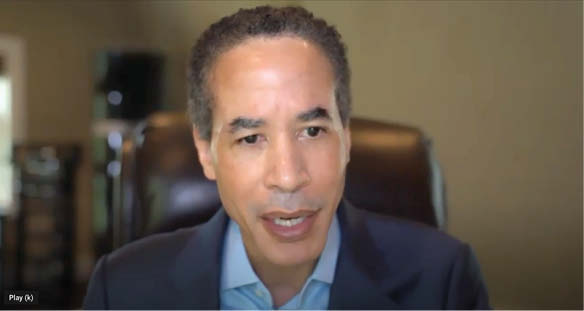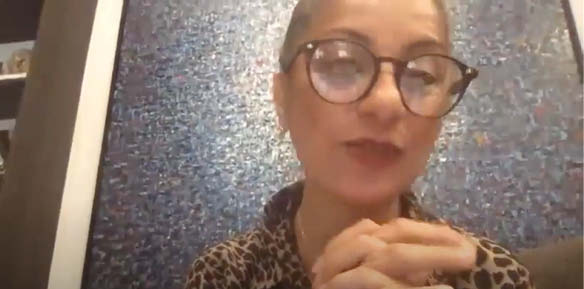Ethnic Media Services: Online Briefing For Ethnic Media
A majority of “mom and pop” small businesses in the United States are founded by ethnic Americans. Many have been decimated by the COVID-19 pandemic. This recent briefing by the Ethnic Media Services together experts to discuss strategies for recovery and even long-term growth. Only 12 percent of African American and Latino businesses and 25 percent of Asian American businesses received stimulus fund loans. Overall, 90 percent of minority and
women founded businesses were shut out of the Paycheck Protection Program.
Speakers at the discussion included Charles Phillips, a Class A director of New York’s Federal Reserve Bank, prominent philanthropist and businessman; Shelly Collins Kapoor, general partner at the Shatter Fund and a member of California Governor Gavin Newsom’s Entrepreneurship Task Force; Sumita Batra, CEO of Ziba Beauty; Congressman Ted Lieu, D-Ca. 33rd district in Los Angeles; Dr. Tung Nguyen, UCSF.
Dr. Tung Nguyen, UCSF update on the pandemic
Dr. Tung Nguyen, professor of medicine at the University of California in San Francisco and director of the Asian American Health Research Center gave an update on the pandemic.
“As of May 28, there were 5.96 million people diagnosed with COVID-19 and 346,00 deaths. In the United States, there were 1.7 million infections and over 100,00 deaths,” he said.
“For the week ending on May 24, 20 states have reported an increase in cases.”
South Korea just shut down 500 schools because of the spike in number of infections. That should worry us because they are better at adhering to social policies than we are.
The way things are going, Dr. Tung Nguyen says there will be a second wave of infections.
L.A. County’s COVID-19 death toll stood at nearly 3,000 Tuesday, and nearly 1,100 new cases of the disease were confirmed, increasing the number of cases to 73,832.
Charles Phillips, a Class A director of New York’s Federal Reserve Bank, on the PPP loans
Charles Phillips, a Class A director of New York’s Federal Reserve Bank, explained that “The Fed” has several facilities for big and small business but most are for larger business. He addressed why it was difficult for small businesses to get the PPP loans.

Charles Phillips, a Class A director of New York’s Federal Reserve Bank,
prominent philanthropist and businessman
Many small minority business owners are funded through Community Development Financial Institutions (CDFI), but Phillips said CDFIs didn’t have access to the first round of PPP funds. Of the more than 1,000 CDFIs in the United States, only 90 participated in the first round of stimulus funding, said Phillips, noting that the process for applying was extremely difficult.
“Only 90 participated in PPP program. The reason is they were not part of Small Business Administration program. They didn’t know how to apply to that program, because that is usually done with larger banks.
“Many customers filled out forms incorrectly and the rules keep changing.
“Some of the small businesses had language issues and they were not able to get the forms completed in time,” he said. “Now moving forward, we have some ideas for that.
Other issues Phillips talked about was the use of the funds. The understanding that at least 75% of the loan needed to be used for payroll but there are businesses who have expenses that are more than their payroll. And it was unclear if the loan was going to be forgiven and that was an issue.
In hindsight, the Fed representative said SBA was not the best choice to disburse the funds.
“If you go to CDFI now, the process will be easier. CDFIs have to learn, don’t do the normal 30- to 60-day documentation process. As long as it looks legitimate and you know them, process the loan,” Phillips said.
Congressman Ted Lieu on recent bills and how we can exit the pandemic
Congressman Ted Lieu (D-Torrance) talk about some ways that we can exit the pandemic and the bills that were passes, which were helpful but not sufficient, he said.
He said the $3 trillion Heroes Act passed last month by the House of Representatives addresses a lot of the gaps from the first stimulus bill, but it has yet to be taken up in the Senate.
One of the changes to the fourth stimulus bill, which provided an additional $300 billion to the PPP, was more money for CDFIs to reach minority businesses.
We ultimately need a vaccine or drug therapy to exit this pandemic. The government wants to say either we stayed locked down for a year or open safely.
Lieu said the economy must reopen but must do so with adequate testing, social distancing and contact tracing. Even then, the number of COVID cases will rise.
“When we reopen there will be additional cases. The question is: can we mitigate enough to reopen safely? It’s not sustainable to keep everyone on lockdown indefinitely,” Lieu said.
Every small business exists in a congressional district and they are here to help. Although the office is physically closed, if small businesses need help, they can contact their congressional office.
Sumita Batra, CEO of Ziba Beauty on small businesses’ challenges
Sumita Batra, CEO of Ziba Beauty, says her stores will remain closed until they have established health and safety protocols to their satisfaction. Her mother, Kundan “Kelly” Sabarwal, a native of Iran, founded the company in 1988 in Artesia, and Ziba has 100 employees and 14 locations, mainly in Southern California malls.

Sumita Batra, CEO of Ziba Beauty
She applied for a PPP loan when the program began and received funds 10 weeks later. Those funds can only be used for operations and payroll after receipt and not for past debts, such as unpaid rents or leases.
She said she was able to get PPP funds not by luck but by using eer contact in her book. She got approved by April 16 and didn’t get funds until last week,” Batra said.
“No one is talking about the bills that accumulated from the day I closed all the way until the day I received my funds. My landlord wants their money.”
Batra said she feels a sense of responsibility to create safety protocols for the threading industry to open up in a responsible manner. As well as being prepared on how to keep themselves safe from customers that might be infected.
“Nail industry and us, we need to come together to partner and create a safe environment and it is possible, and it will take time,” she said.
Shelly Kapoor Collins, a general partner at the Shatter Fund, which invests in women-founded businesses, said even in a good economy, women get only two percent of venture capital funds.

